|
JAPAN’S BUSINESS LEADERS
|
| breaking the glass ceiling |
| japan’s business leaders provide insight and advice |
| by Anthony Al-Jamie |
|
Carlos Ghosn, the ambassador of change, the icebreaker, le cost killer, the troubleshooter, or however you wish to refer to him, is Japan’s hero that has provided a glimmer of hope to leaders of thousands of ailing corporations who are desperately seeking solutions to their problems. Ghosn boldly entered Japan’s business arena with a passion and determination that had not been seen by the Japanese since Akio Morita and Sony took the US electronics market by storm. Since arriving in Japan in 1999, Ghosn took Nissan from the brink of bankruptcy to a profit-making entity in just two
years.
|
|
| |
|
| |
|
| |
|
| |
|
| |
|
| |
|
|
Empowering his employees, enforcing accountability and measuring performance are just a few of the ways that Ghosn leveled the playing field at Nissan. According to Ghosn, “You have to explain why you need to change, how you are going to change, and what is the expected result. If you can explain, then people will give you their full support.” He describes motivation of people and environment as key elements in the success of any organization. “Your employees must be interested in what is going on in the company. Nothing is more inefficient than a boring company. You have to create an interesting environment where people are interested in the story you are creating and want to hear the happy ending.”
According to Ghosn, success does not come easy. “If you have a problem, people should not sleep at night until the problem is solved. If there is something wrong, they need to feel accountable and responsible.”
Ghosn believes that one of Japan’s most valuable assets is its human resources. “It is not by chance that this small country that was devastated by the Second World War and has no natural resources became the second largest economy in the world. Japan’s past success is largely due to Japan’s most valuable asset — its human resources. They are the best that an industry or business can hope for.
|
|
|
They are loyal, dedicated, disciplined people and they are the greatest asset Japan has.” Ghosn has brought a unique perspective to Japan in regards to managing these resources. “Fairness is important. You should be fair to performance, not people. Being fair to people independent to contribution is not motivating. Why would an employee want to take a risk and put forth additional effort if they are going to be treated exactly like others who were unwilling to take that risk or put forth the extra effort?”
All indications show that there is a growing number of business leaders that concur with Ghosn’s policy of not judging or rewarding employees based on the University that they graduated from, their age, or their gender, but rather on their performance and contribution to the organization. This new attitude is starting to catch on in Japan and the dream of equal-opportunity employment is closer to a reality than ever before. However, many feel that Japan is still wasting its most valuable resources. While young men in their twenties on a large scale are unsure of their goals, and in which direction they should put their
|
|
|
energies, young women seem to be energetic and enthusiastic about finding their niche in society. Unfortunately in far too many situations, these young women share a similar problem with young men in that they are having difficulty in focusing their energies in a direction that may help them to become more influential in the workplace and the result is that the youth of today are not having as positive an impact on the corporations they work for as one would hope. A number of American business analysts who have studied the human-resource situation in Japan believe that females in their late twenties to their early forties are the most efficient employees and a look at the foreign-capital companies’ staffing practices here in Japan would suggest that they subscribe to this theory. However, to date few traditional Japanese companies have realized the benefit of providing career opportunities to these enthusiastic and experienced women.
|
|
|
| |
|
BREAKING THE GLASS CEILING
|
| |
 |
| |
|
Carlos Ghosn, CEO, Nissan
|
|
Tokyo Journal sat down with Carlos Ghosn and many of Japan’s most prominent male and female business leaders to discuss what Japan needs to do to improve on the use of its most valuable resource.
TJ: Mr. Ghosn, what do you think about young Japanese women in the workplace? Many people believe there is a glass ceiling — an invisible barrier preventing women from moving up the Japanese corporate ladder.
CG: It is difficult to disagree with this. If you look at the number of women in management positions in companies including Nissan it is so small that you cannot say that you have fair treatment. To say so would not be true. On top of it being frustrating for women, I think it is a waste for companies because there is a lot of waste of talent and a lot of potential that we will never be able to deliver if better opportunities are not given but the way to move from the present situation to a much better situation is through processes by which you hire, you train, you coach, you nominate people — not in function of their gender or in function of their citizenship but in function of their true contribution and if you limit yourself only to the true contribution of people, I am sure that there will be many more women in the corporate ranks and in particular in management positions. I think you will see a revolution here in Japan. I am ready to bet that in 10 years from now we are going to see many more women in management ranks than you have today.
|
|
| |
 |
| |
|
Dr.Anthony Al-Jamie interviewing Carlos Ghosn
|
|
“I am ready to bet that in 10 years from now we are going to see many more women in management ranks than you have today.”
Carlos Ghosn
|
|
| |
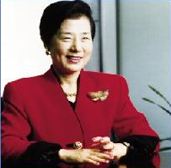 |
| |
|
Yoshiko Shinohara, President,Tempstaff
|
|
Tempstaff Co. Ltd.’s President Yoshiko Shinohara is known as one of the most affluent women presidents in Japan. She began her career as an employee at Mitsubishi Heavy Industries,studied abroad in Europe and worked in Australia where she came up with the idea of Tempstaff Japan, which has now grown into one of the largest temporary staffing agencies in the nation.
TJ: Have you ever been discriminated against for being a woman?
YS: I don’t know if I have ever been discriminated against. I was born a woman and I will always be a woman. Since I have never been a man, I do not know if people are treating me different than if I were a man. Perhaps there may be some disadvantages to being a woman, but nothing too serious. If you ask me, I think I am in a better situation because I am a woman. I have been able to gain certain advantages — for example, when I visit with clients they are able to relax with me and tell me many things they may not have revealed if I were a man. Most men feel relaxed talking to women and for me this is certainly an advantage. I have heard many women complain that they cannot borrow money from banks and they are treated unfairly in business. I have never felt like that. If I did experience the glass ceiling during my early days of employment, I was probably too young to even realize it. I think Japanese society is still dominated by men, but these days, this is changing very rapidly. Some women only complain, but complaining gets you nowhere. If women work hard and try hard, they will find the glass is not so thick. They need to break through the Glass Ceiling!
|
|
| |
|
JAPAN’S BUSINESS LEADERS
|
| |
 |
| |
|
Koshiro Kitazato, Chairman & CEO, BT Japan
|
|
Koshiro Kitazato is CEO and Chairman of British Telecom Japan. He spent some 37 years with Fujitsu in various senior management positions such as President of Fujitsu Spain, General Manager of North America Business, and Group President for Fujitsu’s International Computer business prior to joining British Telecom.
TJ: Mr. Kitazato, your company is known for being an equal-opportunity employer. Tell us, how do women fare when compared to their male colleagues in the business world?
KK: My professor friends tell me that girls often score better than boys in testing at schools and universities. I hear that these young women work, study harder and communicate more effectively than boys but once they enter the business field in Japan, somehow or another, women get less opportunities. Therefore they become frustrated and disappointed. At my former company, Fujitsu, we gave opportunities to women but there are still no women on the main board. It still seems as though there are less opportunities for women. Even though women show better performance and capability just after graduating from university, they are not utilized well. Here at British Telecom, we have a lot of women in management and on the Board as well. Women are moving Japanese society so if you don’t target women, you will not succeed in business. In political elections if you do not get the support of women you will not win. Companies that utilize women effectively are usually quite successful and that says something.
|
|
| |
 |
| |
|
Michelle Kristula-Green
President & Representative Director
Beacon Communications K.K.
|
|
Michelle Kristula-Green is President and Representative Director of Beacon Communications. She is a graduate of the University of Chicago and has lived in several countries around the world. Prior to coming to Japan, she spent a significant amount of time in Taiwan and China.
TJ: As a working mother, have you had much support?
MG: I have full-time care. I think that has made a big difference and my husband has been very flexible especially when my children were younger. If we said whose career took priority, mine took priority and his didn’t, so it has never been an issue of conflict in terms of choosing between my career or my children. I’ve been very lucky in that I have been able to have both aspects. It is an issue we are struggling with now in our office because a lot of our senior staff are female and some of them are having babies. We are trying to really work the issue of balancing their work with the fact that daycare in Japan is still quite difficult.
TJ: Have you ever felt you were discriminated against for being a woman?
MG: No. I have never felt that being a woman was a barrier. I think being a woman has been a positive thing for me as well as a benefit for our clients.
|
|
| |
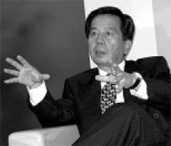 |
| |
|
Shig Sando
Vice President and Director
NTT Global Account Relations
Global Government Relations Organization
Motorola
|
|
Shig Sando is a Vice-President and Director at Motorola in Japan. He has been with Motorola for 17 years and began his career with NEC where he worked for over 8 years in semiconductor development.
TJ: Mr. Sando, you have a distinguished career in multinational corporations and over the years have managed a large number of young men and women. What advice can you provide to Japanese companies in relation to motivating their youth?
SS: It is important to measure each individual and their accomplishments. We cannot judge by just what university they graduated from. Young people love to learn and they love to be trained. So if we treat them fairly, train them well and measure and reward their results, it will increase motivation.
TJ: What advice do you have for young women who want to compete in Japan’s competitive business arena?
SS: Take advantage of training opportunities like an MBA program. It is also important to find someone you can really trust and not necessarily obey them but try to learn as much as possible from someone you like. Identify who you like, what you like about them and why. This will help you better understand where you want to go and how to get there.
|
|
| |
|
BREAKING THE GLASS CEILING
|
| |
 |
| |
|
Nancy Knipp, Managing Director
Japan,American Airlines
|
|
Nancy Knipp is American Airlines Managing Director in Japan. She began her career as a travel agent and then moved into American Airlines where she has been for some 23 years.
TJ: Nancy, you have worked in numerous areas of your organization. You must have a very in- depth understanding of the whole company.
NK: I would say I have a very broad understanding from airport operations to sales and marketing to more strategic-focused positions, but I haven’t quite changed an engine on a 777.
TJ: Would you say your female employees work as well as your male employees?
NK: They sometimes are required to try harder. I come from Texas and one of our local politicians once said Ginger Rogers did everything Fred Astaire did when they danced . . . she just did it in high heels and backwards.
TJ: What is your biggest challenge as a non-Japanese female Managing Director in Japan?
NK: Well, there are various challenges. For example, I have been in meetings where the people in the meeting would not make eye contact with me. When I asked questions, they would direct the answers to my male colleagues. I don’t get offended. I always tell myself there is a cultural reason why this person is not comfortable. It is just a matter of gaining their respect and proving to the person that you are knowledgeable, that you know what you are doing, and that you have the ability to listen and understand them. What is really important is to be strong and focused, and maintain very high ethical standards and credibility while at the same time being approachable. I sometimes see females in business who try too hard to be one of the boys. I think I am fortunate. I have had some incredible female role models at American Airlines. American is a very strong supporter of women in business. In fact, we were voted as one of 2002’s 100 best companies for working mothers.
|
|
| |
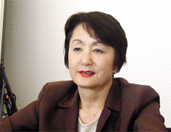 |
| |
|
Fumiko Hayashi, President,Volkswagen Tokyo K.K.
|
|
Fumiko Hayashi is the President of Volkswagen Tokyo. She began her career in the automobile industry as a salesperson at Honda. She then moved to BMW where she became a branch manager and later became President of Volkswagen Tokyo.
TJ: Ms. Hayashi, you have had an extremely impressive career in the automobile industry. How did you enter the industry?
FH: In 1977 I went shopping for a car and realized that I could do the job of the salesperson. I had been looking for a career with equal opportunity. I contacted the Honda car dealer and asked for an interview. They told me that they didn’t hire women as salespeople but I persisted and convinced them to give me an opportunity. My dream came true and I worked for Honda for nearly 10 years where I sold an average of 140 cars per year. I later moved to BMW where I sold more expensive cars and was able to sell 100 cars per year. I became a Car Dealership Manager at one of the branches before I was scouted by Volkswagen and I have been successful in achieving many of my goals while in this position.
TJ: What is your key to success?
FH: As a salesperson, I placed great importance on hospitality and customer satisfaction. In those days, car salesmen sold cars based on the specs of the cars and the car’s marketing power. However, I established firm relationships with potential customers and I sold cars with my hospitality.
TJ: What is the most important aspect of management?
FH: We must train employees well. I believe that employee satisfaction is more important than customer satisfaction. There needs to be smooth communication between the boss and the employee. It is important not only for the employee to report to the boss but for the boss to also report to the employee. Mutual trust is also essential for a comfortable working environment.
TJ: In Japanese society, females often have difficulty in getting promotions. What is your advice? FH: It is a female’s job to show their motivation and talent to the employer in order to demonstrate their ability to work as well as males. The situation for female employees is getting better in Japan but it is the responsibility of the females to work hard and make a strong effort in
order to promote this change.
|
|
| |
|
JAPAN’S BUSINESS LEADERS
|
| |
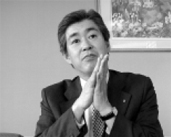 |
| |
|
Hiroyuki Watabiki, Deputy General Manager Telecommunication & Broadcasting Dept. Tokio Marine & Fire Insurance Co. Ltd.
|
|
Hiroyuki Watabiki is the Deputy General Manager of Telecommunication & Broadcasting at Tokio Marine & Fire Insurance Co., Ltd. Watabiki started his 25-year career at Tokio Marine in 1979 and has worked in Chiba, Hiroshima, Fukuoka and Tokyo. Born in Honolulu, Hawaii, Watabiki moved to Japan as a child and graduated from Meiji University’s Economics Department.
TJ: Are there many female employees in your company?
HW: Tokio Marine is the first company in Japan. We were first established in the Meiji Period and this is our 124th year. Every year we have many new female employees. They work very hard, and are very bright and energetic. Of our 17,000 total employees, approximately 60% are female. Most are office workers but a few are in management positions.
TJ: Do you think there is any difference between male and female employees?
HW: I think there is no difference between male and female employees. We have two types of employees: one type must move either to a different place in Japan or around the globe. The second type does not change their place of work and almost all of these employees are female.
|
|
| |
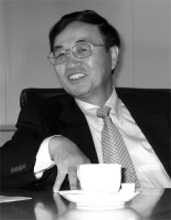 |
| |
|
Masakatsu Mori, Chairman & Representative Director
Accenture Japan Ltd.
|
|
Masakatsu Mori is the Chairman and Representative Director of Accenture Japan Ltd. He has been with the organization for some 34 years and helps major clients like Sony, Toshiba, and Yamaha to remain globally competitive.
TJ: Is the education system preparing Japan’s youth for the demands of the future?
MM: It is clear that we have to reform the education system. Our only resource is people. So it is very critical that we improve our education system and leadership.
TJ: What is your advice for young people?
MM: You have to keep up with what is going on and maintain your competency. You have to stay marketable. Being marketable is the best job security. Corporations cannot keep the promise of lifetime employment anymore. If you are not competitive and marketable they will let you go. So keep educating yourself. That is your responsibility as an individual — to stay competitive in the market, not in the company.
TJ: What do you think of women in the workplace?
MM: We are trying hard to put more women in management positions. I want to make this the best place for women to work. Women work in all of our departments but we need more female managers and of course, more female consultants, although I am not sure if society is ready for this. Things are slowly changing for women but it is very slow. Personally I try to look for the best person for the job regardless of gender.
|
|
| |
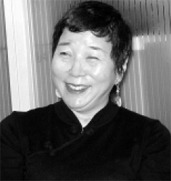 |
| |
|
Miyako Kanamori, Executive Director
Hori Production, Inc.
|
|
Ms. Miyako Kanamori is a Board Member of Hori Production Inc., one of Japan’s most elite production companies and entertainment agencies. She is a graduate of Gakushuin University and has worked for Horipuro for over 20 years.
TJ: You have spent the past 35 years of your life since your husband passed away as a single mother and businesswoman. Do you have any advice for other single mothers who are working? MK: Yes, just try to do your best. Single mothers cannot play the role of both mother and father perfectly and you have to come to the realization that there are going to be some disadvantages for your children. You just do your best.
TJ: Any advice for married women who hope to have a career someday?
MK: Think about what your purpose of life is. Think about what is important to you. You shouldn’t worry too much about putting your career on hold for marriage. I put my career on hold for ten years. If you find happiness in your family, you will have lost nothing. Even if the pause in your career caused you to miss some opportunities, you will still have gained a great deal and remember that a career is not everything.
TJ: What has been your biggest challenge?
MK: To juggle my career and my child. When I began my career, my child was just starting elementary school and to keep up with both schedules was pretty tough.
|
|
| |
| |
|
BREAKING THE GLASS CEILING
|
| |
 |
| |
Mutsuya Asano,Vice President
IBM World Trade Asia Corporation
|
|
Mutsuya Asano is Vice-President for IBM World-Trade Asia Corporation. A graduate of Waseda University, he joined IBM in 1970 and has been with the company ever since.
TJ: When it comes to Japan’s youth, what is their competitive advantage over youth in other countries?
MA: I have confidence that Japanese young people are very innovative and I think that they are good at teamwork — something the Americans and Europeans are just learning to do. I want our young people to compete globally. In other Asian countries young men and many young women are pursuing post-graduate education and the companies are demanding talented and highly educated people like in the U.S. So the young people are working hard to fill this gap. However, this doesn’t seem to be the case in Japan. I think it is a supply and demand problem that is preventing the growth of higher education. Also I think education is a very important element to strengthen each company’s competitiveness, and the Japanese universities are not providing what is needed in business education. They are not keeping up with the needs and demands of the corporate world which is faced with global competition. My biggest concern is that young people are losing confidence in the future of Japan. Young people lack experience but they have great imagination. This is their greatest tool and they have to use their imagination and energy to succeed.
|
|
| |
 |
| |
|
Golbarg Parstabar, President, Harry Winston Japan
|
|
Ms. Golbarg Parstabar is President of Harry Winston Japan Group. Parstabar has been with the jeweler with a 100-year-old history since 1986 and manager of Japan since 1991. Born in Tehran, Parstabar studied international commerce and languages in Switzerland before studying liberal arts and gemology in the U.S.
TJ: What are your thoughts on the Glass Ceiling?
GP: The glass ceiling is in your mind. It is only there if you think it is there.
TJ: What is your advice to young women starting their careers?
GP: My advice to young women is to start competing with others, and start competing with yourself. Spend your time wisely, and if you are ever going to do your MBA, just do it. The chances of success are much greater than failure. I think it is important to stay true to yourself and don’t try to be something you’re not.
|
|
| |
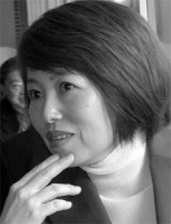 |
| |
|
Mari Matsunaga, Director, Bandai Co., Ltd.
|
|
Mari Matsunaga is a Writer and Board Member of Bandai Co., Ltd. She began her career with Recruit and worked there for 20 years as a magazine editor prior to moving to NTT DoCoMo where she worked in the development of i-mode.
TJ: You began your career with Recruit — a company that is known for being liberal. Tell me about it.
MM: There is no glass ceiling at Recruit. The founding President, Eiko Konno who is the current Chairperson is a woman. The top sales person and the top management are all female.
TJ: Rumor has it that you are a good manager of young people. How do you do it?
MM: The purpose of coaching is to help people pursue their goals. I try to understand the individual values of young staff. Then, I try to provide them with opportunities that match their goals.
TJ: Have you ever experienced the Glass Ceiling?
MM: My focus has always been on the design and development of new projects and my goal has never been to be on top. In fact, I was once offered a director position, but I rejected it because I was interested in working on a new project.
TJ: What advice can you give to young women who are thinking to start a career but have not decided on the direction?
MM: Consider the fields that you might be interested in and go talk to people who are working in those fields. Do your research, but if you still can’t decide try something and see how it works
out. Even if it is not your dream job, it may lead to something else in the future.
|
|
| |
|
JAPAN’S BUSINESS LEADERS
|
| |
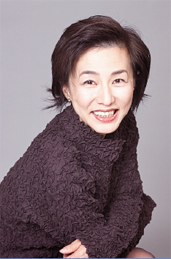 |
| |
Kaori Sasaki, President and CEO, eWoman Inc.
|
|
Kaori Sasaki is President and CEO of both ewoman, Inc. and Unicul International, Inc. www.ewoman.co.jp is an online community and a forum for exchange for active working women. Unicul is a communication consulting agency that deals with translation and interpretation in 70 different languages. Sasaki is a graduate of Sophia University and is a former news reporter for TV Asahi’s “News Station” and an anchor for “60 Minutes” in Japan.
TJ: How do you motivate your young staff?
KS: I encourage them to enjoy what they do. I believe enjoyment is a source for passion. When you have passion for what you are doing, you become very creative and responsible. Your productivity increases and you communicate about what you are doing more with others. So I often share our company goals and vision in order to create a common vision and motivate our team to produce the best results possible.
TJ: Have you ever had to deal with the glass ceiling?
KS: Since I am an entrepreneur there is no glass ceiling internally, of course. That’s why I chose to start my own business. However, there are still glass ceilings around you and you never know when one will appear above you. Sometimes you are so busy, that you don’t even notice that you passed through the first one but there could be a second one. I trained myself not to see these issues as gender barriers in this society. I know there are but when I acknowledge a problem as an obstacle in front of me I don’t attribute the problem to my being a woman, because if you start thinking this is the reason, then you have to have a sex change operation to solve the problem, right? It might be the reason, or a minor reason but if you study and get past the problem, it means that it is not a gender issue. There are many glass ceilings, glass walls and glass floors in the man’s world as well. So actually, it is not only a female issue.
|
|
| |
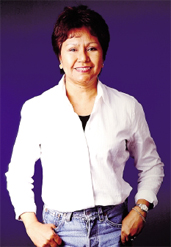 |
| |
Maria Mercedes Corrales, President, Levi Strauss Japan
|
|
Maria Mercedes Corrales is President of Levi Strauss Japan. She first joined Levi Strauss & Company at its Philippine subsidiary where she worked in the Human Resource Department. She is an MBA holder and a graduate of Duke University.
TJ: Do your work and family responsibilities every clash?
MC: Very often — especially when my children were younger, but I am very fortunate to have a very supportive husband and parents who took care of my children and gave the same discipline they gave me.
TJ: Do you ever find situations where you feel discriminated against for being a foreigner or a woman?
MC: I think being treated differently is true in almost all human relationships that are just starting when you don’t know whether you can trust the other person, because you don’t know enough about him or her. Women from third world countries like myself need to work harder to establish trusting relationships in the business world. I am aware that it is there, but I don’t think of myself as a victim. I try to establish trust very early on in the relationship. At the end of the day, it is what you deliver that will earn respect for you — not your gender or the color of your skin.
TJ: What advice do you have for female businesswomen wanting to compete in the highly competitive field of business here in Japan where women do not always get fair treatment? MC: Don’t try too hard to be accepted. Prove that you are competent, you can take increasing responsibilities and are capable of making tough decisions, as well as consistently beat your performance targets. Also read up so that you are knowledgeable about everything happening around you. I would also advise against acting like a man. A woman’s nurturing nature is a definite asset in business. Most importantly, manage your expectations.
TJ: What is your advice for young women wanting to launch their careers here in Japan? MC: Competence and excellence have no gender. But competence, excellence and heart are a potent combination that can work wonders if used correctly — and the trio are traits that are
natural to women. Everyone — regardless of culture or race — responds to kindness and respect.
|
|
| |
|
BREAKING THE GLASS CEILING
|
| |
 |
| |
|
Reiko B. Lyster, President & CEO
Elle International Co., Ltd.
|
|
Reiko B. Lyster is President & CEO of Elle International Co., Ltd. Lyster began her career with Max Factor in Japan and later worked in the U.S. at Revlon, Estee Lauder and Pfizer before returning to Japan and founding Elle International in 1979.
TJ: What are your thoughts on the youth of today?
RL: Young people have never really gone through difficult times. The same goes for their parents since many of them were born after the War, so they only know good times when Japan became the #2 economy in the world. They never learn to strive to get what they want. Parents give them whatever they want and don’t really discipline them. Also, I think the school system has gone in the wrong direction and teachers have lost their authority. That is why today you don’t see young people who are really independent. They really don’t know what they want. If they run into a problem, it is always somebody else’s fault. They lack confidence, patience and determination.
TJ: What advice do you have for young women who want to make a difference but feel their jobs are not important?
RL: Well, they should try to have a positive attitude and make improvement in whatever job they are doing. For example, if your job is to make photocopies, think of how to make the copies nicer for the boss to make them easier to look at. If you make a consistent effort, you will eventually be recognized.
|
|
| |
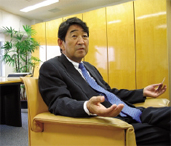 |
| |
|
Takashi Endo, Chairman, Benetton Japan Co., Ltd.
|
|
Takashi Endo is Chairman of Benetton Japan Co., Ltd. A graduate of Rikkyo University’s Economics department, Endo began his career in the fashion industry at Seibu Department Store and worked in various positions in Tokyo, Paris and Milano. After being introduced to Benetton in Italy, Endo set up Benetton Japan in 1987.
TJ: What are your thoughts on young people today?
TE: The important thing for young people is “to do” — not just think but move and take action. The person who can move fast, can think fast. I hate it when young people just think and plan, but don’t take any action. It wastes time. The problem with young people is they can eat! If they don’t have food, they have to work hard. Young people should try hard, be motivated, and have some specialty — such as cooking, marketing, or computer skills.
TJ: How are the young employees at Benetton Japan?
TE: People in my shops who are always moving have a good chance for development in my company, but those who are just waiting for clients to come to them have no future.
|
|
| |
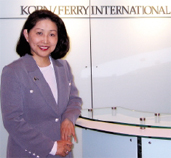 |
| |
|
Sakie Fukushima, Regional Managing Director
Korn/Ferry International
|
|
A graduate of Stanford University’s MBA program and Harvard University’s Graduate School of Education, Sakie Fukushima is the Regional Managing Director and Leader of Global Consumer Markets-Japan for Korn/Ferry International. Prior to joining Korn/Ferry International Ms. Fukushima was a consultant at Bain & Company, a major strategy consulting firm. A member of the Japan Association of Corporate Executives, Ms. Fukushima has been voted as one of the top ten women leaders in Japan.
TJ: Have your work and family responsibilities ever clashed?
SF: My work and family responsibilities have not clashed since we do not have children. I would never have done this had I not gotten married with my husband, Glen. He has been extremely supportive and I have been extremely lucky. He is probably more confident in me than I am confident in myself. So when I have to do new things he’ll say, “Of course you can do that.”
TJ: What is your message to young people starting their careers?
SF: Work hard and try to expand your limits before giving up, because I think people define their capacity too quickly. I started my business career when I was 35 and I am turning 54 this year, so my recommendation is that it is not too late for anybody and particularly learning is something that is never too late.
|
|
| |
|
JAPAN’S BUSINESS LEADERS
|
| |
 |
| |
|
Haruo Kawahara, President & CEO
Kenwood Corporation
|
|
Haruo Kawahara is President & CEO of Kenwood Corporation. In addition to his 40-year career at Toshiba, Kawahara has worked in the investment industry as a Senior Advisor.
TJ: What are your thoughts of young people entering your company?
HK: I believe the young people in our organization are very nice, cheerful and positive people, but in many ways they are very naïve because they don’t have the opportunity to get out and meet the end-user of our product. We are in the consumer-electronics business and the last person we deal with is the distributor or retailer — but through our daily activities, we don’t get to meet the end user. It is for this reason that I urge them to get out and meet people.
TJ: Why is that?
HK: It is important for them to learn more about the real world. I was fortunate enough to have a wide variety of learning experiences while living abroad and I do my best to share my experiences with the young people in our organization. I believe that young men and women are energetic and enthusiastic and I am impressed by their positive attitude.
|
|
| |
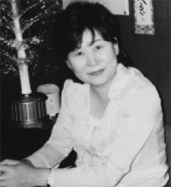 |
| |
|
Hitomi Kitayama, President, Niki Resort Inc.
|
|
Hitomi Kitayama is a Board Member of Eikoh Seminar, Japan’s largest preparatory school and the CEO of Niki Resort. She is an entrepreneurial restauranteur and a hotel owner. Her unique hotels located in the Japanese countryside of Nasu attract guests from all over the world.
TJ: Many of Japan’s brightest young women are seeking equal-opportunity employment with foreign-capital companies and the Japanese companies are missing out on these over-achievers. What are your thoughts on that?
HK: Young people want to work someplace where they are going to be treated and evaluated fairly — a place where they can feel achievement. Salary alone is not a big enough motivation for them. Japanese companies must attract the best employees by creating an attractive work environment.
TJ: Many young women in Japanese organizations complain about the glass ceiling which prevents them from moving up the ladder.
HK: The glass ceiling is a very difficult problem. This problem is not only in companies — it is a social problem. It is a problem that local communities, schools and each Japanese individual must face.
TJ: Have you ever been faced with the glass ceiling or discrimination?
HK: I never take hardships as hardships. I just don’t give up. I just try to make tomorrow a better day than today. I have been working that way for over 30 years. If I am unable to succeed at something today, I simply try to do a better job tomorrow. So I am trying my best, learning from my experiences, and pursuing my dreams.
|
|
| |
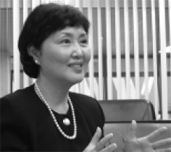 |
| |
|
Kazuko Mayahara, Director, Operations
Kodak Japan Ltd.
|
|
Kazuko Mayahara is Director of Operations at Kodak Japan, Ltd. A graduate of De Paul University in Chicago with a degree in mathematics, Mayahara started her career 15 years after finishing school and spent the great majority of her career in the United States.
TJ: Have your work and family responsibilities clashed?
KM: My priority has always been my family, so I have done things differently. What I would do if I couldn’t finish something and I had a deadline to finish something by, is I would go home with my work. I would pick up my kids, feed them, put them to bed and do my work at home to compensate for not being able to stay at the office and work overtime. If I had a business trip, and my kids had a special event, then I would try to plan the dates around that occasion. If I couldn’t avoid the conflict, I would at least come home for that occasion and then fly back to wherever I was.
TJ: Is the situation for working women improving?
KM: I could not have done the same thing in Japan because I think it is still very difficult here, but many women are thinking about their career and what they want to do with their lives. Women’s issues are talked about more often today and the whole society is changing. However, not enough women are really seriously focused on their career yet. Although the opportunities are out there, they are not paying that much attention to them. Getting married and having children are very important, but you can also balance a career side by side.
|
|
| |
|
BREAKING THE GLASS CEILING
|
| |
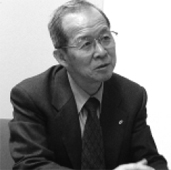 |
| |
Yasuhiko Kawasumi, Executive Staff Strategy & Regulatory Department
Japan Telecom Co., Ltd.
|
|
Yasuhiko Kawasumi is a Public Relations Executive at Japan Telecom Co., Ltd. He began his lifetime career in telecommunications at KDD (now KDDI) and moved to Japan Telecom in 1997. He has served on numerous telecommunications advisory boards, both governmental and private.
TJ: What do you think about women’s opportunities in the Japanese workplace?
YK: I think there has not been equal educational opportunities for women throughout the history of Japan. It wasn’t until after World War II that women were allowed to enter Tokyo University. I think that as more women pursue MBAs new opportunities will arise. Once they have an MBA, there is no difference between a man and a woman in the workplace. We have many young female managers and Department Directors who have MBAs from Harvard and other schools in the United States.
TJ: What do you think has been the greatest change in how young people are dealt with in the company over the past few decades.
YK: This is the Internet age. We are flat — no hierarchy. The young people can send e-mail messages directly to the CEO or President of a company and the CEO can communicate with the young employees over the Internet. Well, ok — maybe there is still a hierarchy, but not so many layers.
|
|
| |
 |
| |
|
Ms. Hitoko Takeda, Executive Managing Director Systems, Production Control & Security Officer Nikkei Business Publications, Inc.
|
|
Ms. Hitoko Takeda is the first woman Executive Managing Director at Nikkei Business Publications and is in charge of policy related to some 41 journals. Her duties and responsibilities are vast and she is the highest-ranking female in the Nikkei Group.
TJ: Ms. Takeda, what advice do you have to young women launching their business careers?
HT: It is essential to have stamina and the will to continue. There are plenty of excuses and reasons for getting frustrated and upset. Getting upset is easy, but to find positive reasons to continue is the real challenge. If you try to escape from your problems, they will follow you and you will someday face the same problem again. When I was first hired here, I decided to stay for a minimum of 5 years, regardless of what kind of work I was given. I did not want to be like the other female employees who could not finish what they started and gave up in the middle of the process.
TJ: Do you have any advice for those responsible for managing female employees?
HT: Yes. Do not spoil them by helping them finish their work or letting them go home before finishing their job.
TJ: Have you experienced the Glass Ceiling?
HT: Yes. The publishing field is very conservative. Some men cannot stand to see women do the same job they are doing. So, they hinder the women’s efforts by holding back vital information, etc. but this is not a reason to give up. If you make a strong effort you can overcome any adversity.
|
|
| |
 |
| |
|
Yoichiro Yatsurugi, President,AT&T Asia Pacific
|
|
Yoichiro Yatsurugi is President of AT&T Asia Pacific. He started his career with IBM in 1978 and spent 21 years with IBM in sales, distribution and at the corporate headquarters. He now serves the Asia-Pacific region as AT&T’s most senior officer.
TJ: Mr. Yatsurugi, your company has a reputation for hiring very highly motivated staff. How do you go about hiring?
YY: During the interview process we look for aggressiveness and assertiveness. This has a priority over their university name or paper test scores. Through the interview, we assess how aggressive they are and how straightforward they are. We place great importance on how they explain their thoughts and their goals. Through this process I think we have been quite successful in hiring motivated young staff. We also look for those who went to school in the U.S. and out of the 30 people we hired last year, 5 or 6 graduated from U.S. universities.
TJ: Tell me about your female employees.
YY: I think they are very highly motivated. 30% of our employees are female. We have one female board member and there are several females at the management level. The numbers of female managers seem to be growing year by year.
TJ: What area do you think your young employees need to improve on?
YY: They need to learn to communicate more openly. Sometimes they are too patient and too quiet. This is a very big deficiency in the Japanese business culture and we need to improve on it so that we can become more effective.
|
|





















































